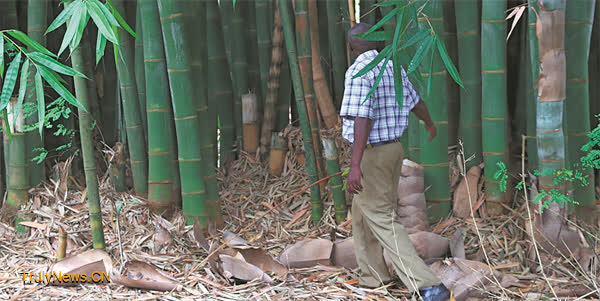
A worker inspects a bamboo forest in central Kenya.[Photo provided by Feng Yiwei/Xinhua]
While ceramic crockery and polycarbonate cutlery are commonly used in Kenya, eco-friendly Chinese-inspired bamboo products are gradually making their way into more homes in the country.
The International Bamboo and Rattan Organization is a Beijing-headquartered intergovernmental body dedicated to promoting the use of bamboo and rattan for sustainable development.
When the organization’s experts visited Kenya to train farmers on bamboo utilization, Edmond Machoki was among those from Nyeri county in central Kenya who quickly seized the opportunity to receive training and benefited greatly.
Machoki’s newfound knowledge and skills in bamboo have empowered him to deftly craft a range of items such as crockery, cutlery and other utensils, turning what started as a hobby into an income-generating business.
With a diploma in biotechnology, Machoki started working with bamboo eight years ago. He worked as a research officer at the Kenya Forestry Research Institute for two years before landing a job with a private company that manufactures bamboo items.
Machoki’s expertise in the treelike grass played a defining role in the company’s decision to recruit him.
“From there, I learned more about bamboo through on-the-job training. In most cases, we were trained by the Chinese experts either online or they trained us when they visited,” Machoki says.
The bamboo value chain is a lucrative business for him, from its seedlings to plantation and product level.
Most of the technology used in Kenya originates from China, where bamboo has been integrated into the culture for years, he says.
Machoki and his peers, including Josphat Muthumbi, are adding more bamboo crockery and cutlery to cupboards and shelves across Kenya.
Muthumbi initially started by making chicken-feeding troughs from the giant grass in 2002. He perfected the art of crafting various items over time, including bamboo coin-saving cylinders, cups, cutlery holders, cutlery, cooking utensils and knives.
Among his handmade pieces, bamboo cups stand out as the most eye-catching.
“I realized it was easy to make cups from bamboo because of its hollow nature and ability to hold liquid,” Muthumbi says.
He has attracted many customers who take pride in using eco-friendly cups and is outsourcing raw materials from bamboo farmers, providing a market for a bamboo plantation.
For customers Jacinta Njoki and Solomon Gitau, using bamboo items has greatly helped reduce pollution and conserve the environment.
“Embracing wooden crockery and cutlery will greatly help in environmental conservation. They will help fight the menace of plastic, which has been a big issue in Kenya and other African countries,” Njoki says.
“I find them easy to clean — they are natural and devoid of harmful chemicals. Therefore, there are no known side effects when they come into contact with heat,” Gitau says.
Bamboo has holes and a canopy that absorbs and stores water during rain, says Machoki. When the dry season comes, it releases the water slowly to the roots, which contributes to raising the water table.
From an economic perspective, the fast-growing plant comes in handy for making timber, he explains.
“It can make up to 1,500 products and make timber from which you can make floor tiles, furniture, and roofing, among others,” Machoki says.